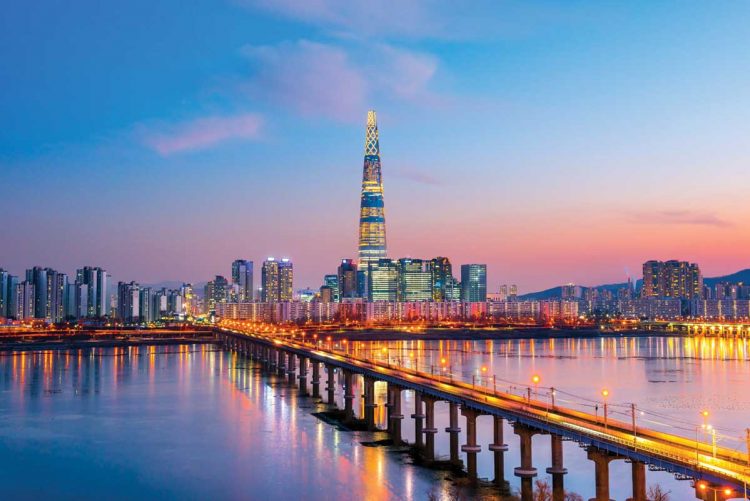Inside Asian Gaming takes a closer look at South Korea’s embattled foreigner-only casino market as it battles to survive a barrage of regional headwinds and the crippling COVID-19 pandemic.
I cannot think of a more vulnerable Asian gaming market than Korea,” says Andrew Klebanow, Principal of Klebanow Consulting, as he surveys the damage left across the Asia-Pacific region by the COVID-19 pandemic.

“Its 16 foreigner-only casinos are wholly dependent on gamers from other nearby countries for all of their gaming revenues. This leaves the sector vulnerable to any number of threats including geo-political and natural.
“Korea’s casino industry will eventually rebound once the pandemic abates but it will always be vulnerable to similar crippling events. Every country in East Asia that prohibits its citizens from entering casinos will never enjoy the economic impacts that integrated casino resorts can have on a nation.”
One of the more established casino destinations in Asia, South Korea’s casino industry dates back to 1967 with the opening of the Incheon Olympos Hotel Casino, the first casino under the country’s dominant foreigner-only casino operator Paradise Group.

Exactly 40 years later, Paradise would launch South Korea’s first integrated resort – Paradise City – just a short stroll from the original Incheon Olympos Hotel site in what looms as a preview to the industry’s hopes for a brighter future ahead.
Paradise City, opened in April 2017, is one of three integrated resorts now operating nationwide, with the other two – Landing International Development’s Jeju Shinhwa World (opened February 2018) and Lotte Tour’s Jeju Dream Tower (December 2020) – both, as the names suggest, located on the holiday island of Jeju.
In total there are now 16 foreigner-only casinos in Korea, split evenly at eight apiece between Jeju and the mainland. They were bringing in a combined KRW1.44 trillion (US$1.21 billion) in casino turnover as of 2019, before the COVID-19 pandemic struck a crippling blow.
Notably, Jeju’s figure of 512 gaming tables is more than twice that in the capital city of Seoul, with 215, despite the city of Seoul attracting 17.5 million visitors in 2019 compared to Jeju’s 15 million.

“If Chinese visa-free travel does not resume, I think it will become a problem and it will be too many casinos,” said one industry expert when asked about Jeju.
“The IRs will either need to replace Chinese customers, drive more domestic tourism or reset expectations.”
There is also the not-so-small matter of Kangwon Land, the only casino in the country at which locals are allowed to gamble, which brought in more than the 16 foreigner-only casinos combined in 2019 with turnover of KRW1.48 trillion (US$1.24 billion).
Yet even before the onset of COVID, Korea’s rapidly expanding casino market found itself facing unexpected headwinds.
In 2015, an outbreak of the deadly Middle East Respiratory Syndrome (MERS), combined with an economic downturn in China that was also felt in gaming jurisdictions across the region (including Macau), hit Korea’s gaming industry hard.
From a peak of US$348 million in gaming revenue across its foreigner-only casinos in 3Q14, sales rapidly fell between 2014 and 2017 – reaching US$300 million just once from 2Q15 and falling to around US$250 million by early 2017.
Then, in March 2017, Beijing announced a ban on all travel groups to its close neighbor after South Korea confirmed plans to install a THAAD missile system following increased military activity north of the border.
The result was devastating for Korea’s foreigner-only casinos, which rely heavily on visitation from China – to this day the country’s number one source tourism market – for their bottom line. From a high of 8,067,722 Chinese visitors in 2016, just 4,169,353 arrived in 2017 and 4,789,512 in 2018, recovering slightly to 6,023,021 in 2019 before COVID decimated international tourism.
Klebanow notes that, while China’s punitive action in 2017 was relatively short lived, “it illustrated how vulnerable the [Korean] casino sector is to shifts in political winds.

“This is not to say that Korea’s casino industry is alone in its dependence on foreigners for all of its customers; it is just that its political alignment with the United States makes it an easy target for Chinese sanctions. Countries such as Cambodia and Laos are closer allies to the PRC and are dependent on China’s Belt and Road initiative. That makes them a bit more compliant.”
The THAAD dispute aside, South Korea’s foreigner-only casinos may have far greater reason for concern when it comes to China in the years ahead. In August of last year, China’s Ministry of Culture and Tourism announced it had established a “blacklist” of overseas tourist destinations it said were disrupting the nation’s outbound tourism market by opening casinos targeting mainland Chinese customers.
The new blacklist system for cross-border gambling tourist destinations, the Ministry added, would see travel restrictions imposed on Chinese citizens going to overseas cities and scenic spots named on the blacklist.
While no specific destinations were named, it was prophesied that South Korea was almost certainly one target alongside the likes of the Philippines, Cambodia, Vietnam and Australia.
According to Klebanow, this blacklist “should be of concern to any casino operator in Korea.
“The foreigner-only casinos have long targeted Chinese [gamblers] and many have developed business relationships with Chinese junket promoters.”

Those relationships are likely to be tested given China’s crackdown and global travel issues brought about by the COVID-19 pandemic.
“From a gaming perspective, South Korea is not the most popular destination for junket or premium direct players,” notes Shaun McCamley, Managing Partner at gaming consultancy firm EuroPacific Asia.
“Inflexible management styles, freezing winters and political issues through foreign policy dictates are not user friendly compared with other Southeast Asian markets.”
It’s not all doom and gloom, however.
Once home to a litany of small and noticeably limited casino operations, the arrival of Paradise City in Incheon in 2017 and more recently Jeju Shinhwa World and Jeju Dream Tower highlight Korea’s recognition of the need for true integrated resorts if the country is ever to truly compete on the regional gaming stage.

Shinhwa World, highlighted by an array of family attractions including an expansive waterpark, boasts 2,000 guest rooms, a variety of F&B options, retail, Jeju’s first convention center linked directly to a hotel and the island’s largest casino at around 5,775 square meters of floor space.
The casino at Jeju Dream Tower will open soon in a similarly sized space, with operator Lotte Tour currently in the process of transferring casino operations from their current home at Lotte Hotel Jeju.
“If and when COVID is over and flights and visa free travel return to normal Jeju and Dream Tower have a great opportunity,” offers Yona He Poda, long-time SVP, Asia Pacific of Forbes Travel Guide and previously with Four Seasons in Hong Kong.
 “Dream Tower, Shinhwa and Paradise are developed with entertainment at their core, so will naturally draw regional holiday-makers and family.
“Dream Tower, Shinhwa and Paradise are developed with entertainment at their core, so will naturally draw regional holiday-makers and family.
“Korea’s proximity to China and Japan is an advantage, although I think it may take two years to see a significant turnaround.
“While Shinhwa is family themed, Dream Tower is targeting grown-up leisure with Korean branded shopping, spas, pools, lounges, cabanas and a variety of dining.”
There is no doubt, however, that any such recovery can’t come soon enough.
According to information supplied by the Korea Tourism Organization, gaming revenue at Korea’s 16 foreigner-only casinos combined fell 58.7% year-on-year in 2020 to KRW595 billion (US$536.6 million), with mainland casinos experiencing a 58.1% decline and Jeju casinos a 63.6% decline.
So far at least, the trajectory looks similar for 2021. Paradise Co, which alongside Paradise City also operates three more casinos in Seoul, Busan and Jeju, added to its KRW109.5 billion (US$98.4 million) loss in 2020 with another KRW18.20 billion (US$16.1 million) loss in the first three months of this year.
Likewise Grand Korea Leisure, with a KRW64.3 billion (US$57.9 million) loss in 2020, recorded an additional 1Q21 loss of KRW37.4 billion (US$33.4 million). Landing International was yet to report Q1 results at time of publication but saw its losses balloon to US$272 million in 2020.
Such pressures are inevitably of concern in Incheon, where two more integrated resorts are currently under constructionThe first, Inspire Korea, represents the first foray into Asia for US tribal casino operator Mohegan Gaming & Entertainment, with its US$1.6 billion project scheduled for launch in early 2023. Financing concerns and the added pressures of COVID-19 have caused delays, with the Ministry of Culture, Sport and Tourism earlier this year approving a six-month extension to its previous 2022 opening deadline.
For its part, Mohegan has never wavered from its Korean commitment, with former CEO Bobby Soper appointed to a newly created role of International President to oversee Asian expansion efforts and President of Corporate Finance Chris Jones stating the company was “optimistic” about securing financing and ramping up construction.
Less certain is the former Caesars Korea project, now known as Midan City Resort Complex after Las Vegas casino giant Caesars Entertainment pulled the pin. Caesars sold its 50% stake in the development to former partner Guangzhou R&F Properties Co Ltd in February, subsequent to which the Ministry of Culture, Sport and Tourism knocked back a request for a three-year extension to the opening deadline. Guangzhou R&F has been given an additional 12 months instead.
 It’s a sobering reality for a city that had attracted 34 expressions of interest and six submissions when an open tender for two IR licenses was first announced in January 2015.
It’s a sobering reality for a city that had attracted 34 expressions of interest and six submissions when an open tender for two IR licenses was first announced in January 2015.
“Since the casinos are foreigner-only, these resorts really need to target domestic travel, catering to families and staycations to be successful,” says He Poda.
“Paradise City is art and K-pop themed, and I believe the original concept was to attract inter-Asia K-pop fans through weekend concerts, art, culture and weekday MICE with its connectivity to the airport. COVID changed all of this and they are really struggling.
“Mohegan’s concept (if it is to remain this way) with waterparks, geo-nature hiking trails and a sustainability -themed resort I believe will resonate with families attracting both international and domestic travel.
“Both resorts will need to diversify into more entertainment programming to be successful.”
Inevitably, China remains the key to any recovery of Korea’s foreigner-only casino industry. And, despite recent trials and tribulations, all is not lost on that front.
According to Klebanow, it may only take some minor tweaking for South Korea to fall off China’s regional blacklist radar.
“Korea’s past marketing activities were not as egregious as those of other countries that allowed online casinos to target Chinese citizens,” he says.
“Outside of Macau, gambling is illegal in the PRC, and that law has long been ignored by online operators. To my knowledge, Korea does not have an online presence, which is a plus as the PRC reviews its blacklist.
“Korea’s casinos could scale back or cease doing business with Chinese junket promoters, and that may be sufficient to mollify the PRC’s concerns.”
Klebanow also points to Jeju’s standing as a long-time favorite holiday destination of Chinese travelers – a fact that stands it in good stead once pandemic-related travel issues subside.
 “As long as Korean casinos restrict their marketing aimed at Chinese citizens to during their stays in Korea, the PRC will probably continue to tolerate their citizens gambling after a day on the beach,” he offers.
“As long as Korean casinos restrict their marketing aimed at Chinese citizens to during their stays in Korea, the PRC will probably continue to tolerate their citizens gambling after a day on the beach,” he offers.
“I’m an eternal optimist,” adds He Poda.
“I also live in China where most Korean IR customers come from … yes, there is reason to believe Korean casinos will rebound in the coming years because of the pent-up travel demand.
“We see it from living here in China, domestic travel is exceptionally strong. Jeju was a visa-free destination for Chinese from 2014, although COVID changed that. I hope it will be again.
“But when inter-Asia flights return to normal, I am certain destinations like Jeju, Seoul and Busan will be hot again.”































